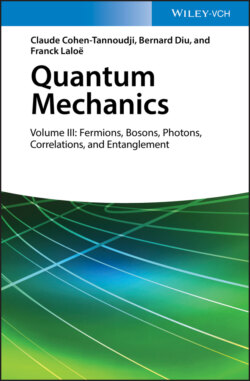Читать книгу Quantum Mechanics, Volume 3 - Claude Cohen-Tannoudji - Страница 148
4-a. Time-dependent Hartree-Fock equations
ОглавлениеAs the choice of the function δf(t) is arbitrary, for expression (33) to be zero for any δf(t) requires the function inside the curly brackets to be zero at all times t. Stationarity therefore requires the ket:
(34)
to have no components on any of the non-occupied states |θl(t)〉 with (l > N). In other words, stationarity will be obtained if, for all values of k & between 1 and N, we have:
(35)
where |ξk(t)〉 is any linear combination of the occupied states |θl(t)〉 (l < N). As we pointed out at the beginning of § 4, adding to one of the |θk(t)〉 a component on the already occupied individual states has no effect on the Af-particle state (aside from an eventual change of phase), and therefore does not change the value of S; consequently, the stationarity of this functional does not depend on the value of the ket |ξk(t)〉, which can be any ket, for example the zero ket.
Finally, if the |θn(t)〉 are equal to the solutions |φn(t)〉 of the N equations:
(36)
the functional S is indeed stationary for all times. Furthermore, as we saw in Complement Exv that WHF(t) is Hermitian, so is the operator on the right-hand side of (36). Consequently, the N kets |φn(t)〉 follow an evolution similar to the usual Schrödinger evolution, described by a unitary evolution operator (Complement FIII). Such an operator does not change either the norm nor the scalar products of the kets: if the kets |φn(t)〉x initially formed an orthonormal set, this remains true at any later time. The whole calculation just presented is thus consistent; in particular, the norm of the N-particle state vector is constant over time.
Relations (36) are the time-dependent Hartree-Fock equations. Introducing the one-particle mean field operator allowed us not only to compute the stationary energy levels, but also to treat time-dependent problems.
